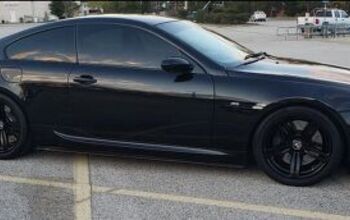Question of the Day: Can Anyone Explain Reliability?
I was pumping gas into my WRX this morning when a man in a Ford F-350 yelled, "I had a 1983 Subaru GL. I drove it until 1992, sold it to a friend who drove it for another 5 or 6 years. Then he gave it to his son. Still on the road, with over 400,000 miles.Your car will never die." I responded that in the 160,000+ miles I'd put on my two WRXs I've replaced a battery and a headlight (though a buddy of mine burnt a clutch — let's not count that). Then there's my girlfriend's 2001 Ford Focus. She barely drives it. At 73,000 miles we replaced the radiator puke tank, thermostat housing and cooling fan and then discovered that all the engine mounts are shot. And those are just the iceberg tips in terms of crap that's malfunctioning. I give the transmission 5,000 more miles, tops. And we're not alone. Google "Ford Focus Radiator Overflow Tank" to meet our compatriots. And my question is why are some makes (or even some years within a make) so very much more reliable than others?


































Comments
Join the conversation
anecdotal evidence is correct. i have seen my fair share of "bad" toyota, lexus and honda's but it certainly is not the norm. (i work at a dealership) I almost exclusively drive Chrysler products and they have been rock solid vehicles. I had trouble with one, a 99 Concorde that had a mechanically unexplained failure in the transmission at 70k miles. No sign of failure or reason for failure when the mechanic broke down the transmission, but it was fixed under warranty.
Reliability is: Chevy small block V8's, and the last generation S10.
I look at reliability from the other side - the manufacturers. For an OEM, it's easy to figure out where the problems are because you are paying out the ass for lots of parts under warranty. For each item on each car the OEM keeps track of how many they have replaced. The total cost per car is tallied up each quarter/year and a total for the corporation is then known. For Honda and Toyota this cost is less than 1.5% of their revenues. For Ford it is 2%, their best ever. So, to me, a reliable make is one that keeps this warranty cost low which keeps their customer satisfaction high. BMW, M-B, GM, Chrysler - all these guys don't spend the money to fix the problems. It's great that some people haven't experienced issues. But IMO they are all unreliable makes. Bottom line? You can't keep building crap and hide behind "technology" or "perception gap." Bullshit. Make the thing right the first time or go home.
Reliability is never, ever, getting it serviced other than planned maintenance. Especially if the dealer is the big 2.8 - taking your vehicle in for service is painful, almost without exception. But if I take our RX330 in for oil change at 45,000 miles and the dealer replaces the AC compressor (under warranty) because my wife complained it was making a whining noise every now and then, I don't count that as an issue. Combine that wife pleasing performance and stellar resale values, that manufacturer has almost guaranteed another purchase. Having my 2006 Chevy TrailBlazer SS on a flatbed tow truck 3 times under 20,000 miles (and could have been towed 3 or 4 more times, but I just gave up and took another car) - not reliable. And I honestly don't abuse it. My Honda CRV is just plain amazing...10,000 mile oil change intervals, and it doesn't break, shake, rattle, or do anything but drive like new (okay - better - I put decent tires on it). I could repeat these stories with the plethora of vehicles I've owned over the past 25 years - Toyota/Honda daily drivers that never fail, and domestic cars that should come equipped with a button on the dash that says "Tow Truck". Oh, wait - that's called OnStar...